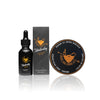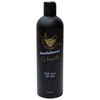A healthy beard is incomplete without a well-established grooming routine.
But, don’t feel bad if you’re unsure where to start or how to care for your beard.
That’s where our expertise comes in.
And frankly, caring for a beard is pretty simple — we promise.
Many beard owners, us included, use natural oils like coconut oil, argan oil, and tea tree oil, to keep their beards growing strong.
But, no worries if you don’t have any of these natural ingredients on hand.
We’re pretty sure you have olive oil.
And yes, olive oil is another all-natural ingredient that’s a powerhouse when it comes to beard health.
In this article we’ll cover what makes olive oil great for beard care, how to apply it, and any potential side effects you may encounter.
Olive Oil Benefits: Olive oil moisturizes beard hair and skin, promotes hair growth, softens facial hair, prevents split ends, and reduces beard itch and dandruff.
Nutrient-Rich Properties: Contains oleic acid and squalane, which deeply hydrate and soften beard hair, making it easier to manage and reducing irritation.
Application Tips: Apply olive oil to a damp beard using a few drops depending on length, massaging from roots to tips; let it sit for at least 15 minutes.
Usage Frequency: For dry or thick hair, use daily; for fine or oily hair, reduce to a few times per week to avoid greasiness and achieve optimal benefits.
Table of Contents
Properties and Benefits of Olive Oil for Beard Care

We know what you’re thinking - yes, olive oil is primarily used when cooking.
And while it makes a great vinaigrette for a salad, it’s also primed to take care of your beard.
But what makes it so great?
Let’s look at some of the benefits of olive oil for beard care — and how it achieves those results!
Moisturizes Beard Hair and Skin
Olive oil moisturizes your hair and skin beneath your beard with two impressive ingredients.
Here they are:
Oleic acid is an emollient, or something with smoothening and softening properties. It’s capable of penetrating deep into the fibers of your hair — providing them with the moisture they need.
Squalane is an anti-inflammatory oil with intense hydrating abilities. It’s used in many eczema and acne ointments.
Together, oleic acid and squalane allow olive oil to resurface your beard.
That means you’ll finally be able to cuddle without your beard poking you or your partner.
If you don’t want to lather your top-shelf, Italian-imported extra virgin olive oil in your beard, you can always use coconut oil. It’s another powerful moisturizer.
Or, you can mix coconut oil with olive oil to double the hydration.
Both your beard hair and skin underneath your beard will thank you.
Promotes Beard Growth
We’re not here to say that olive oil is magic, but it’s pretty damn close.
In 2015, a study concluded that oleuropein, one of the main ingredients in olive oil, has a significant impact on facial hair growth.
What’s more is that olive oil is rich in vitamin E.
And vitamin E is another ingredient that stimulates hair growth. It also protects the layers of your skin from environmental aggressors — like UV rays and pollution.
Additionally, vitamin e helps reduce frizz, increases thickness, and smoothes your beard hair.
So, while olive oil won’t turn a patchy beard into a monster one, it will help it look fuller, thicker, and healthier.
And, for us, that’s more than enough.

Prevents Split Ends
A beard with split ends is an unhappy one.
And once split ends happen, they can’t be repaired.
That means you’ll need to trim the split ends off, losing precious inches of your beard in the process.
But, what if we told you that there’s something you can do to prevent split ends and damage to your beard?
And yes, that something is using olive oil (I mean, what did you expect - this article is all about olive oil).
By moisturizing your hair strands, olive oil increases elasticity and strength, making your hair less prone to damage.
Again, that also means it can better face environmental damage. So even on the hottest and sunniest days, your beard will stay looking shiny.
That means healthier hair, less split ends, and fewer trims.
Softens Your Beard
A well-hydrated beard is a soft beard.
And a soft beard is a beard that you can enjoy.
Thankfully, olive oil softens your beard in as quick as one use.
Compared to alternative essential oils like lavender oil or rosemary oil, olive oil will soften your beard much faster.
Say goodbye to the coarse facial hair and hello to the softness — it’s beardiful (get it?).

Less Itchy Dandruff
Itching, flaking, and dandruff are one in the same.
It all starts with the itch — which is caused by your hair follicles sucking up the oil on your skin, making it dry.
Then you’ll start to notice flakes raining off your beard when your scratch.
At that point, you’re in the dandruff stage. So, what do you do?
Well, you can use olive oil.
While it doesn’t have the antimicrobial properties of tea tree oil, it will moisturize your beard and skin.
However, if you’re dealing with a more advanced case of dandruff, you’re better suited with an antibacterial essential oil, like tea tree oil. Learn how it works it’s magic here.
How to Properly Apply Olive Oil to a Beard
So, you’ve decided you want to use olive oil to keep your beard looking fresh.
But where do you start?
First, you’ll want to know how much use.
Lucky for all the bearded beauties out there, we’ve covered that below.
How Much Olive Oil To Use on Your Beard

The amount of olive oil you use on your beard is crucial.
If you use too much, your beard and skin won’t be able to absorb it all, and you’ll end up with a greasy shine.
And nobody wants their beard to look like a burger from a fast-food joint.
However, too little olive oil and you won’t notice a difference. Your beard hair won’t be smoother, shinier, or softer.
So, the question is, how much olive oil should you use on your beard?
Here’s a table that better explains it:
Stubble |
One drop |
Short beard |
Two to three drops |
Medium length beard |
Three to four drops |
Long beard |
Four or five drops |
Gandalf worthy beard |
More than five drops |
5-Step Process for Applying Olive Oil to a Beard
Another reason olive oil is so great for the beard is that it’s easy to add to your morning routine.
Seriously, it's an easy 5-step process that takes less than five minutes.
Let’s face it… Five minutes is nothing when it comes to growing a beard worth bragging about.
Below you’ll find the best way to apply olive oil to your beard:
Step 1: Wash your beard, either with beard shampoo or warm water. Whatever works better for you.
Step 2: Now it’s time to dry your beard. For shorter beards, you can pat them dry with a towel, for bigger ones, use a hair dryer. No matter what you’re using, don’t dry your beard completely — leave it damp.
Step 3: Apply the suggested amount of oil to your hands and rub them together.
Step 4: Gently massage the olive oil into your beard. Be sure you’re covering the entire beard, from the roots all the way to the tips. If you don’t want to use your hands, we recommend a beard brush. Look for a high-quality one with boar bristles if possible.
Step 5: After applying the olive oil, you want to let it sit. We know it’s hard, but try and refrain from touching your beard for at least 15 minutes.
We recommend following this process in the morning.
That way the olive oil can keep your beard feeling soft and looking smooth for the entire day.
However, if you tend to be in a rush in the mornings, you can apply the olive oil at night — treating it as an overnight treatment.
Either way, after a few regular uses, you’ll start to notice the benefits it has on your facial hair.
How Often Should You Use Olive Oil?
Just like how much you use, the frequency you apply olive oil has an impact on its effectiveness.
So, how often should you apply it?
Unfortunately, there isn’t one straight answer.
Rather, it depends on your skin and hair type.
If you use it too frequently, you’ll have that greasy look. However, too frequently and you won’t have any of the benefits we mentioned above.
We’ve compiled a helpful chart you can follow below:
Dry and brittle hair |
Once or twice a day |
Fine hair |
Two to three times a week |
Thick hair |
Once a day |
Oily or greasy hair |
Once per week |
Side Effects of Using Olive Oil on a Beard

Compared to other oils like peppermint oil, tea tree oil, and jojoba oil, olive oil has fewer side effects.
I mean, most people consume it on a regular basis — so it better be safe.
Still, there are a few downsides. Here’s what we recommend considering before starting to use olive oil:
It Makes Your Hair Greasy
If you have fine hair, olive oil may be too strong of a moisturizer.
Instead of making your beard soft and luscious, it’ll weigh it down — causing it to look greasy and wet.
And nobody wants that.
But, you’re not out of luck completely. Instead of using olive oil, you can use a lighter-weight beard oil.
Additionally, you could mix olive oil with beard oils for the best of both worlds.
Beard oil will provide you with all the same benefits as olive oil, without being as heavy on a scraggly beard. Looking for a little extra hold to help keep pesky fly-aways at bay? Beard balm is worth checking out. Here are a few high-quality options.
Promotes Yeast Growth
Yes, one of the benefits of olive oil was that it prevented dandruff — and that’s still true.
However, it only prevents beardruff caused by dry skin. If your dandruff is a fungal infection, then olive oil is not the cure (and you might have better luck with peppermint oil)!
That’s because olive oil actually promotes yeast growth.
And you want to know what’s a major cause of dandruff?
That’s right, yeast.
Low Heat Protection
A lot of people believe that olive oil can be used as a heat protectant.
But, unfortunately, that’s just not true.
In fact, olive oil can harm your skin and beard if it hits higher temperatures.
Specifically, at 320°F it will start to smoke, releasing free radicals — acne-causing molecules.
While not that many men use heat on their beards, it’s still important to be aware of it.
Conclusion
Now you understand why olive oil is great with pasta and your beard.
However, just because olive oil is beneficial for your hair, doesn’t mean other cooking oils are.
So don’t go pouring vegetable oil on your head.
That being said, if you’re in need of some moisture, olive oil will do the trick.
But, there are plenty of other natural oils out there that can do the same for you. We also recommend coconut oil, jojoba oil, argan oil, tea tree oil, peppermint oil, and castor oil.
Of course, you shouldn’t exclusively use a single natural oil.
For the best results, opt for a high-quality beard oil instead. Not only will you reap all of the above benefits and more - they also smell fantastic.
I mean, who can resist the smell of spiced bourbon or citrusy cedarwood?
Seriously, with beard oil, there’s barely any need for cologne.


